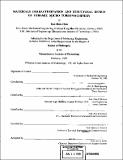Materials characterization and structural design of ceramic micro turbomachinery
Author(s)
Chen, Kuo-Shen, 1966-
DownloadFull printable version (17.06Mb)
Advisor
S. Mark Spearing.
Terms of use
Metadata
Show full item recordAbstract
Since 1995, MIT has been developing the technology for micro-gas turbine-generators capable of producing 50 W of electrical power in a package less than one cubic centimeter in volume. The initial goal of this project is to produce a turbine generator and an all-silicon cooled engine by micromachining single crystal silicon. The goal of this thesis is to explore the structural design issues associated with the micro silicon turbo generator and the all-silicon cooled engine with the aim of establishing a methodology for the design and fabrication of highly stressed microfabricated structures. The major research contributions includes the effect of length scale on materials and structural response, material characterization, structural analysis and failure probability, and heat transfer analysis. Due to the differences in length scales between the microengine and conventional macroscale turbomachinery, a detailed investigation of the effect of length scale has been conducted. This shows that a direct comparison of a microengine structural design with that embodied in microscale engines is largely irrelevant, especially with regard to the material fracture strength. Strength test specimens must have similar length scales and be fabricated by the same processing route as the real structures. The data for fracture strength, fracture toughness, yield strength, and creep resistance of single crystal silicon at various temperatures have been obtained from the literature and experimental investigation. The room temperature fracture strength has been shown to be extremely sensitive to the surface processing route and strength recovery methods have been proposed and tested. The fracture toughness has been found to be temperature independent below the brittle to ductile transition temperature (BDTI). The yield strength has been found to be extremely dependent on the temperature and strain rate above BDTI. High temperatures and low strain rates reduce the available yield strength. The turbo generator rotor has been analyzed using the finite element method. It was found that the stress critical location is located at the root of the turbine blade trailing edge. In order to reduce both stress and deflection levels, various structural redesign approaches were proposed. The finite element stress analysis and the fracture strength test data were combined using d probabilistic structural analysis to evaluate the reliability of the turbogenerator. The all-silicon cooled engines will potentially run in the creep regime of silicon. As a result, thermo-structural analysis is required to assess the trade-off between structural reliability and engine performance. Since the heat transfer, thermal stress, fluid dynamics, and engine cycle performance analyses are coupled, an iterative analysis is required between structural, fluid, and performance design. Finally, the results for material characterization and structural analysis are integrated with the overall designs of the turbogenerator and the all-silicon cooled engine. The analysis and design methodologies presented in this thesis can be applied to other highly stressed power microelectromechanical systems (MEMS), turbomachinery, and the structural design of ceramic components.
Description
Thesis (Ph.D.)--Massachusetts Institute of Technology, Dept. of Mechanical Engineering, February 1999. Includes bibliographical references.
Date issued
1999Department
Massachusetts Institute of Technology. Department of Mechanical EngineeringPublisher
Massachusetts Institute of Technology
Keywords
Mechanical Engineering